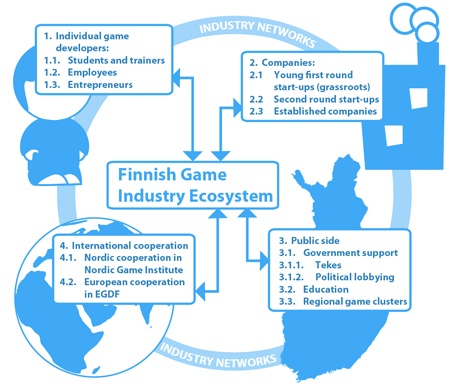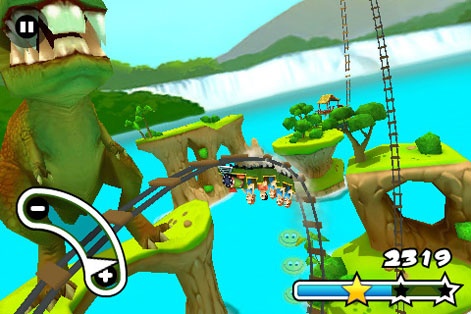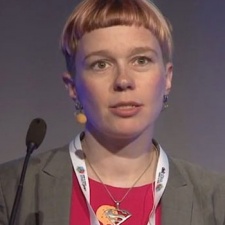In my previous column, I analysed the factors behind the success of the Finnish games industry.
In this article I would like to take this thinking little further and widen the perspective.
I am often asked how long this success will last. Our estimate is a long time, because this success is not based on the success of one company but of many.
In particular, I would like to emphasize our functional ecosystem. In my opinion, when creating long term success, you need to place your attention towards the whole business environment.
In Finland, for example Neogames, IGDA and the Suomen Pelinkehittäjät association have been putting lots of effort into building a healthy environment for the entire game industry.
When it comes to ecosystem development, there are several different areas to take care of.
- Individual game developers
- Companies
- Public and political side (including education & research)
- International cooperation
1. Individual game developers
Individual game developers are the most crucial part of the game industry ecosystem. At least in Finland, the game industry is an industry of passion and people are very committed to it.
There are several executives in successful Finnish game companies who have been in the industry since the 1990s.
They have seen a lot. Some of them have sold their companies to a bigger player. Some have seen their studio being closed afterwards, and maybe even lost their job because of it.
Game companies are not permanent. New companies are founded and unsuccessful ones buried. However, intellectual capital rises even when studios are closed.

In the games industry, the entrepreneurs are - in most of cases - game developers. Often the most successful entrepreneurs are so called second-round entrepreneurs e.g. former employees of game companies. Hence they have been able to gain lots of knowhow, experience and contacts.
For them stepping out and founding their own business is a lot easier than for others. In our experience first-round game developers are often too idealistic and view their business with unrealistic expectations.
Luckily game development, especially mobile game development, is not equity intensive. So if the business isn't succeeding, the damage is often more emotional than financial.
In addition, after such a lesson in reality, these people are often very good employees for other more established companies.
2. Companies
There are approximately 200 game companies in Finland, of which over 50 percent are less than three years old.
There are three different kinds of companies.
- Young entrepreneurs starting their first start-up
- Second-round start-ups and,
- Established companies.
Our mission is to help companies to progress in their business and rise up in the food chain. It is wonderful to see how already successful companies help the newer ones.
3. Public support
From an ecosystem point of view, the aim of our operations is to create as positive as possible an environment in which game companies can do their business.
For that we need political support for companies and proper education system to produce talented employees.
In terms of government funding we have Tekes (National Funding for Technology and Innovation) and its Skene program. Tekes funds game companies and, among other things, organizes business events and scouts emerging markets.

We also have several game clusters in Finland taking care of the regional game industry ecosystem.
In Finland, games are recognized as a part of culture. For example, Neogames Finland is partly funded by Finland Ministry of Culture and Education.
4. International cooperation
Neogames has been cooperating with other Nordics countries for several years through the Nordic Game Programme (which is funded by the Nordic Council of Ministers). And two years ago, the Nordic Game Institute was founded.
Cooperative trade missions are one of the most important focuses and, of course, our legendary Nordic Parties are held at many conferences.
At the EU political level, Neogames is a founding member of the European Games Developer Federation (EGDF), which gives European game developers leverage when negotiating with the EU about political issues.
5. Industry networks
As I mentioned in my previously column, in Finland, we have highly functional industry networks.
- IGDA Finland - for individual game developers
- Suomen Pelinkehittäjät - the Association of the Finnish Game Studios
- Neogames Finland - an umbrella organization to support the Finnish game industry
All these networks cooperate together on different levels.
IGDA Finland organizes industry lectures and developer gatherings. Suomen Pelinkehittäjät represents the interest of game developer studios. Neogames is the representative of the Suomen Pelinkehittäjät association and in addition it also represents the interests of game education and research.
How long will these glory days last?
But back to our original question; how long will the success last?
This success is not based on the success of one company but of many.Suvi Latva
The reason why I have such a strong belief that this success will continue is that we have very strong and healthy game industry ecosystem on different levels.
We get new talented employees from schools; we are finally starting to have decent game industry education of our own. Finland attracts experienced game industry professionals internationally. We have several established and successful game companies willing to help new companies.
Recently we have also seen lots of new, interesting second-round start-ups. We have 15-20 promising new stars such as Small Giant, Seriously and many others.
In addition the Finnish game industry is not just focusing on mobile games.
Mindfield Games has been blowing our minds with the trailer for Pollen, and established companies are doing fine too; Remedy with Quantum Break and Housemarque with Alienation.
Our industry networks play well together and we have very tight developer community based on trust and hardworking attitude. Even though we've learned some small talk, we still mean what we say.
And from a societal point of view, we've gained credibility for the Finnish game industry and gained support from the government.
As long as we keep taking care of every aspect of our ecosystem, I believe the Finnish game industry will continue to write its won success story. The future doesn't exist. You have to create it.
Suvi Latva is the coordinator of Neogames Finland.
Neogames Finland is a non-profit organization which supports and promotes the Finnish game industry and its ecosystem.






















